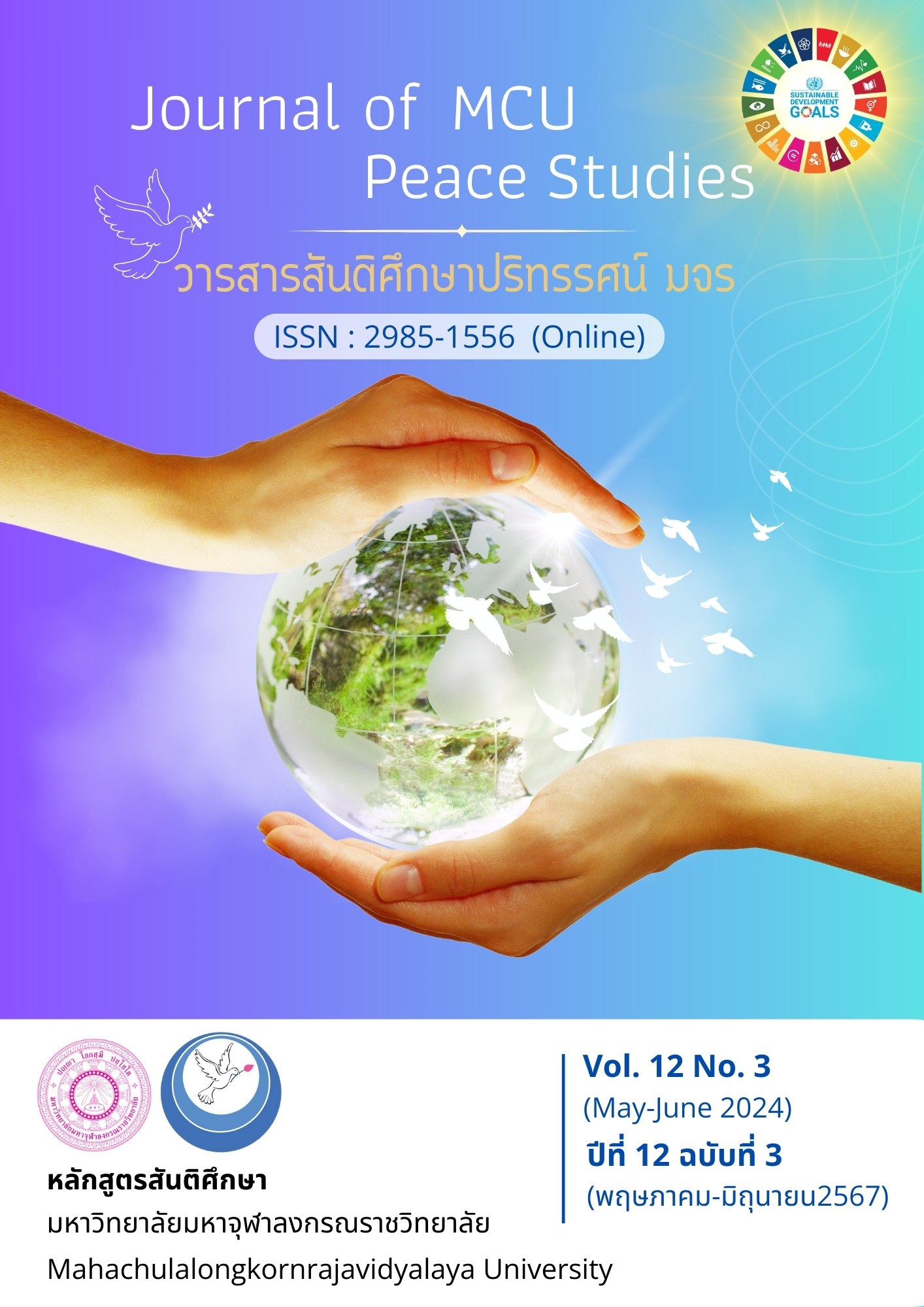การพัฒนากรอบความคิดแบบเติบโตเพื่อเพิ่มความยืดหยุ่นทางจิตใจ เมื่อเผชิญปัญหา
Main Article Content
บทคัดย่อ
กรอบความคิดแบบเติบโตเป็นตัวแปรที่ถูกพูดถึงมาหลายทศวรรษโดยเฉพาะในประเทศไทยได้นำมาบรรจุเป็นนโยบายในการสร้างความก้าวหน้าให้กับวงการการศึกษา และการพัฒนากรอบความคิดแบบเติบโตสามารถเพิ่มความยืดหยุ่นทางจิตใจเมื่อเผชิญปัญหาได้ โดยอาศัยทั้งปัจจัยภายในและภายนอกประกอบไปด้วย 1) การเชื่อในตนเองว่าสามารถพัฒนาเพื่อเอาชนะปัญหาได้ 2) การยอมรับต่อปัญหาที่เกิดขึ้น เป็นความเข้าใจว่าอารมณ์เชิงลบเป็นการตอบสนองตามธรรมชาติของมนุษย์เพื่อดำรงชีวิตให้อยู่รอด และ 3) การมีสัมพันธภาพที่ดี ซึ่งเป็นการดำรงอยู่ในสภาพแวดล้อมที่เต็มไปด้วยกลุ่มคน เพื่อนฝูง หรือครอบครัว โดยอาศัยการช่วยเหลือซึ่งกันและกัน เดิมทีกรอบความคิดแบบเติบโตคือตัวแปรที่สอดคล้องกับสัมฤทธิ์ทางการเรียนหรือการทำงาน แต่บทความนี้แสดงให้เห็นว่าเมื่อสามารถบรรลุตัวแปรทั้งหมดนี้ ย่อมส่งผลให้มีภูมิต้านทานต่อสิ่งกระตุ้นเชิงลบที่เกิดรอบๆ ตัว รวมไปถึงการเข้าใจหรือตระหนักรู้ต่อสิ่งที่เกิดขึ้นจนสามารถฟื้นกลับมาสู่เส้นทางได้อีกครั้งหนึ่ง
Article Details

อนุญาตภายใต้เงื่อนไข Creative Commons Attribution-NonCommercial-NoDerivatives 4.0 International License.
ทัศนะและความคิดเห็นที่ปรากฏในบทความในวารสาร ถือเป็นความรับผิดชอบของผู้เขียนบทความนั้น และไม่ถือเป็นทัศนะและความรับผิดชอบของกองบรรณาธิการ ยินยอมว่าบทความเป็นลิขสิทธิ์ของวารสาร
เอกสารอ้างอิง
American Psychological Association. (2014). The Road to Resilience. Retrieved July 28, 2023, from http://www.apa.org/helpcenter/road-resilience.aspx
Bibi, A., Kalim, S., & Khalid, M. (2018). Post-Traumatic Stress Disorder and Resilience among Adult Burn Patients in Pakistan: A Cross-Sectional Study. Burns & Trauma, 6(1), 1-6.
Blackwell, L., Trzesniewski, K., & Dweck, C. S. (2007). Implicit Theories of Intelligence Predict Achievement across an Adolescent Transition: A Longitudinal Study and an Intervention. Child Development, 78(1), 246-263.
Boonsupa, C. (2021). Positive Psychological Capital. Retrieved August 1, 2023, from https://sircr.blogspot.com/2021/06/positive-psychological-capital.html
Butr-Indr, B. (2018). Law and Artificial Intelligence (AI). Thamasart Law Journal, 47(3), 491-511.
Duckworth, A. (2017). Grit: Why Passion and Resilience Are the Secrets to Success. United Kingdom: Penguin Random House.
Dweck, C. (2007). Mindset: The New Psychology of Success. New York: Ballantine Books.
Elaine, E., & Carol, D. (2023). The Growth Mindset Workbook: CBT Skills to Help You Build Resilience, Increase Confidence, and Thrive through Life's Challenges. California: New Harbinger.
Hardy, B. (2020). Personality Isn't Permanent: Break Free from Self-Limiting Beliefs and Rewrite Your Story. New York: Portfolio.
Harvard Business Review. (2015). HBR's 10 must Reads on Emotional Intelligence. Massachusetts: Harvard Business School Publishing. Retrieved July 23, 2023, from https://archive.org/details/modernideasabout0000bine/page/n3/mode/2up
Keltner, D., Sauter, D., Tracy, J., & Cowen, A. (2019). Emotional Expression: Advances in Basic Emotion Theory. Journal of Nonverbal Behavior, 43(2), 133-160.
Luthans, F., Abolio, B., Avey, B., & Norman, M. (2007). Positive Psychological Capital: Measurement and Relationship with Performance and Satisfaction. Personnel Psychology, 60(3), 541-572.
Ministry of Education. (2017). Growth Mindset and Educational Reform. Retrieved August 3, 2023, from https://www.moe.go.th/growth-mindset-กับการปฏิรูปการศึกษา/
National Scientific Council on the Developing Child. (2014). Excessive Stress Disrupts the Architecture of the Developing Brain. Journal of Children's Services, 9(2), 143-153.
Neff, K. (2011). Self-Compassion, Self-Esteem, and Well-Being. Social and Personality Psychology Compass, 5(1), 1-12.
Perry, B., & Winfrey, O. (2021). What Happened to You? : Conversations on Trauma, Resilience, and Healing. New York: Flatiron Books; An Oprah Book.
Rudland, J., Clinton, C., & Wilinson, T. (2019). The Stress Paradox: How Stress Can Be Good for Learning. Medical Education, 54(1), 40-45.
Sandberg, S., & Grant, A. (2019). Option B: Facing Adversity, Building Resilience, and Finding Joy. New York: Knopf.
Shrivastava, A., & Desousa, A. (2016). Resilience: A Psychobiological Construct for Psychiatric Disorders. Indian Journal of Psychiatry, 58(1), 38-43.
Sommers, S. (2012). Situations Matter: Understanding How Context Transforms Your World. United States: Penguin Publishing Group.
Tsai, J., & Morissette, S. B. (2022). Introduction to the Special Issue: Resilience and Perseverance for Human Flourishing. Psychological Trauma: Theory, Research, Practice, and Policy, 14(S1), S1–S3.
Warunwutthi, N., Wattananonsakul, S., & Ekpanyaskul, C. (2022). The Effectiveness of Growth Mindset Counseling Program to Enhance Students Resilience in a Public Autonomous University in Thailand. Journal of Research and Curriculum Development, 12(1), 1-9.
York, J. (2022). Bosses Have Long Said Workers Need a Growth Mindset. Now, this Skill Is More Important than Ever - and It’s Possible to Master It. Retrieved July 27, 2023, from https://www.bbc.com/worklife/article/20221026-the-growth-mindset-all-workers-need-to-cultivate


